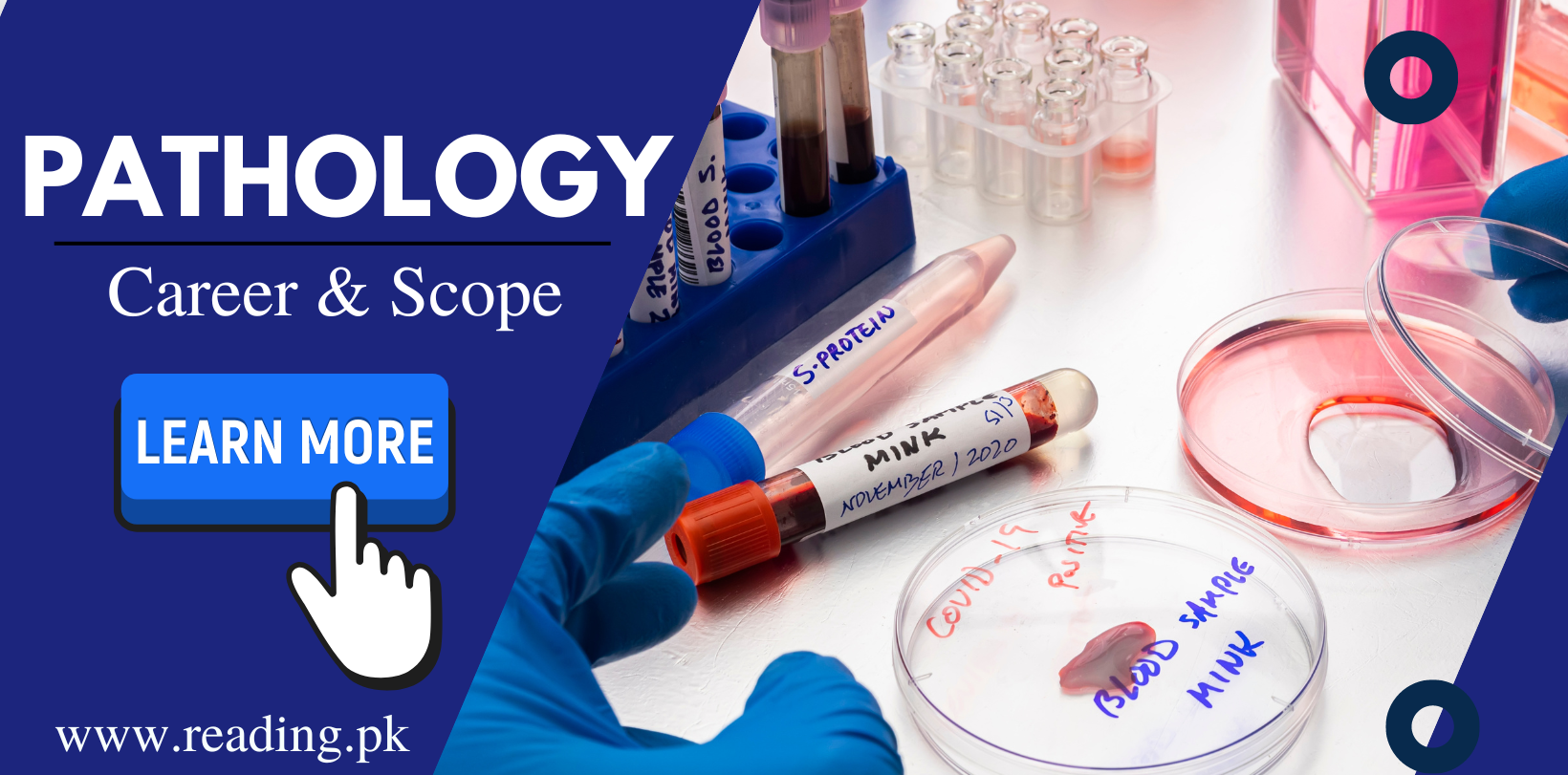Pathology Career in Pakistan offer promising prospects for those interested in diagnostic medicine and medical research.In the medical area of pathology, illnesses are studied in detail, including their nature, causes, and consequences. Anatomical pathology and clinical pathology are its two primary sub fields.
To diagnose diseases like cancer, anatomical pathologists analyse tissues, organs, and cells while highlighting the scope and traits of pathological alterations. Contrarily, clinical pathologists use laboratory tests to examine bodily fluids in order to diagnose and track illnesses including diabetes, infections, and blood abnormalities.
By offering crucial diagnostic insights, directing treatment choices, and participating in clinical research, pathologists play a significant part in the provision of healthcare. Their work aids doctors in developing successful treatment regimens and providing patients with care. Furthering our understanding of illnesses and their underlying causes via pathology is essential for help enhance overall health and medical results. It is the cornerstone of contemporary medicine, with pathologists acting as the so-called “heroes” in the fight against numerous illnesses.
[lwptoc]
Pathology Career in Pakistan
The foundation of all medical practise is pathology, which includes all facets of patient care, such as diagnostic procedures and treatment strategies. Pathologists participate in a variety of medical procedures and evaluate new technologies to provide a variety of therapy choices that can help treat illnesses and prevent them. They put a lot of effort into developing the best treatment for a variety of deadly illnesses, viruses, and infections.
In Pakistan, there is a huge need for qualified professionals in the field of pathology, hence it is normal to encounter a pathological technician without a job. Lab tests are incredibly important to medical science. For this reason, a sizable network of laboratories is being developed in all nations on the planet. A pathologist with certification can easily find work in the commercial or public sector.
The brightest minds begin their laboratories after some training. If you’re interested in starting your own pathology lab, carefully study the business practises of your current workplace or earn at least a bachelor’s degree in pathology.
Pathology Career in Pakistan | Scope and Job Opportunities

Pathology Scope in Pakistan
So whether you’ve already started or are considering it, consider the breadth of pathology. You must first keep in mind that Pakistan has a large pool of pathologists that are educated and qualified. Hospitals, research labs, and colleges all have a significant demand for pathologists as instructors.
Furthermore, even if it is not in demand in Pakistan, you can be employed and appointed while you are still a student on a global scale. If you believe you possess the abilities to accurately detect disease behaviours, such as having a keen eye for detail and the ability to think critically and solve problems, you should pursue a degree in pathology.
Types of Pathology
The four most typical applications of pathology are as follows:
- Pathology of Chemical:By employing biochemical testing to detect or treat patients, nature is where you combine clinical and laboratory expertise. utilising chemical pathology’s specialisation of metabolic medicine. Patients with improperly functioning chemical problems will be able to receive treatment from you.
- Haematology: You’ll be able to identify and handle bone and blood marrow disorders. Additionally, you’ll help out at the blood bank’s haematology diagnostic laboratory.
- Histopathology: By using tissue and cell samples for medical interpretation, you will be able to recognise and examine illness. Your work evaluating and staging tumours is crucial to controlling cancer. You’ll also do autopsies to identify the reason of death.
- Medical Microbiology:You will handle the diagnosis, treatment, and prevention of infections in patients and the wider public when studying medical microbiology. You will be in charge of the medical laboratory, which will serve as a liaison between the lab and the physicians. Treatment for bloodborne diseases and other newly developing viruses is known as medical virology.
Major Branches of Pathology
- Plant Pathology
- Veterinary Pathology
- Anatomical pathology
- General Pathology
- Clinical Pathology
- Speech Language Pathology
Pathology Major Subjects
The list of the most crucial themes and topics for postgraduate and graduate pathology courses in Pakistan is provided below.
- Research Methodology
- Mass spectrometry
- Chemistry for children in the preschool age
- Writing for medical and literary research
- Principles of the QC and assurance
- Biostatistics & SPSS Data Analysis
- Thesis and Seminar
- Testing point care and automation
- Animal Handling
- Basic Principle of Laboratory Medicine
- Analytical techniques & Instrumentation
- Biochemical Analytes
- Major Lab Methods
- Lab Management
- Medical Laboratory Technology
- Molecular Diagnostic & Genetics
- Interpretation of clinical data
- Basic Lab Technique and Procedure
- Clinical Endocrinology
- Basic Laboratory Principles
- Toxicology and monitoring of therapeutic drugs
- Analytical methods for evaluation
- immune chemical technique
- Major Biochemical Assay Methods
- Instrument handling
- Pathophysiology
Employment Sectors
- Medical Diagnostic Labs
- Medical & Dental Colleges
- Para Medical Institutes
- Homeopathic Colleges
- Colleges of Eastern Medicines
- Research Labs & Institutes
- Medical Research Journals
- Private & Government Hospitals
- Postmortem
- Forensic Departments of Medical Colleges and Hospitals
Career Options in Pathology
You’ll be prepared to begin your pathology profession once you’ve earned a medical degree, finished your residency, and obtained your medical licence. You can work as a nurse or doctor and in a variety of health-related fields:
- Anatomic Pathologist
- Cytopathologist
- Clinical Pathologist
- Histopathologist
- Chemical Pathologist
- Hematopathologist
- Virologist
- Microbiologist
- Forensic Pathologist
- Pediatric Pathologist
- Neuropathologist
- Molecular Genetic Pathologist
- Dermatopathologist
- Medical Technologist
Eligibility Criteria for Pathology
- You must meet the qualifications for the position if you want to work as an ophthalmologist in Pakistan. You must first complete five years of medical school, earning an MBBS or BDS, and two years of specialisation in a particular field. After that, you can carry on with your pathology studies in the area in which you are most interested.
- You can pursue BS pathology if you are interested in pathology after finishing FSc pre-med; however, in this instance, you must choose a specific subject in which you can specialise throughout four years of study and a one-year residency at any public hospital.
- If you have a BSc in one of the aforementioned fields, you are qualified to apply for admission to the MSc programme in pathology in Pakistan after finishing your BSc.
Major Responsibilities of Pathologists
Pathologists are medical researchers. They are in charge of investigating the nature of the ailment or infection, its origins, and any potential repercussions. They provide a wide range of services that essentially encompass every facet of clinical medicine.
They can ascertain the cause of the illness or infection and how it affects the cells and tissues. To make a precise diagnosis, they then decide on the signs, symptoms, and other diagnostic procedures. Pathologists use a variety of clinical techniques and examinations of tissues and cells to identify illnesses. By keeping an eye on and assuring the health of their patients, they help doctors create the best treatment plan possible.
Here’s the list of tasks you’re expected to carry out as a pathologist.
- To find out if your blood cells are abnormal, review the findings of your blood test.
- Cancer and other chronic disorders are diagnosed by biopsies and test smears.
- To find cancer, use tiny needle aspirations.
- Perform autopsies to identify the underlying cause of the disease or the manner of death.
- Discuss test findings with medical professionals and advise additional testing as needed.
- To find effective vaccinations to stave off infectious illnesses, conduct clinical trials.
- Research and experimentation are used to provide novel testing and effective treatment options.
directing lab staff to produce clinical reports and guarantee the validity of test results - meetings with nurses, physicians, surgeons, and other healthcare professionals to discuss a potential treatment plan.
